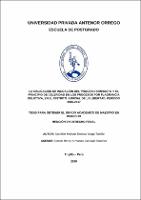Mostrar el registro sencillo del ítem
La obligación de incoación del proceso inmediato y el principio de celeridad en los procesos por flagrancia delictiva, en el distrito judicial de La Libertad, periodo 2016 - 2017
| dc.contributor.advisor | Carbajal Sánchez, Henry Armando | |
| dc.contributor.author | Mego Tarrillo, Michael Ernesto | |
| dc.creator | Mego Tarrillo, Michael Ernesto | |
| dc.date.accessioned | 2019-11-27T16:52:20Z | |
| dc.date.available | 2019-11-27T16:52:20Z | |
| dc.date.issued | 2019 | |
| dc.identifier.uri | https://hdl.handle.net/20.500.12759/5707 | |
| dc.description.abstract | Esta investigación se ha desarrollado en el marco de la problemática sobre la determinación de la eficacia del proceso penal inmediato en el sistema jurídico peruano; es decir, en la discusión sobre si este proceso simplificado logra cumplir con la finalidad por la cual fue regulado y reformado a través del Decreto Legislativo N° 1194. De esta manera, se plantó el problema de, ¿en qué medida, con la obligación de incoar el Proceso Inmediato dispuesta en el Decreto Legislativo 1194 se garantiza el principio de celeridad procesal en los procesos por flagrancia delictiva en el Distrito Judicial de La Libertad, 2016-2017? Preliminarmente, se respondió al problema con la hipótesis de que, en la medida que se incumple con los plazos que establece el Proceso Inmediato, aun obviando la investigación preparatoria y la etapa intermedia, pasando de las diligencias preliminares al juicio oral, la obligación de su incoación no garantiza el principio de celeridad procesal en los procesos de flagrancia delictiva en el Distrito Judicial de La Libertad, 2016-2017. A fin de poder contrastar esta hipótesis se elaboró un marco teórico base, se analizaron y discutieron casos específicos de procesos inmediatos por flagrancia delictiva y por delitos de incoación obligatoria (como la Conducción en estado de ebriedad y la Omisión a la asistencia familiar), y se discutieron los resultados de entrevistas y de la jurisprudencia recabada. En consecuencia, se confirmó la hipótesis planteada preliminarmente, llegando a la conclusión de que la obligación de incoar el proceso inmediato no ha garantizado el principio de celeridad procesal; puesto que, en la práctica judicial, no ha sido posible cumplir con los plazos legales preestablecidos. Asimismo, se identificaron problemas que impiden llegar a una justicia penal célere, como el abuso del principio de oportunidad frustrado por el imputado, y la no posibilidad de hacer comparecer de manera célere al imputado al juicio inmediato. | es_PE |
| dc.description.abstract | This research has been developed within the framework of the problem of determining the effectiveness of the immediate criminal process in the Peruvian legal system; that is, in the discussion on whether this simplified process achieves the purpose for which it was regulated and reformed through Legislative Decree No. 1194. In this way, it’s set the problem of, to what extent, with the obligation to initiate the Immediate Process set forth in Legislative Decree 1194, is the principle of procedural celerity guaranteed in proceedings for flagrante delicto in the Judicial District of La Libertad, 2016-2017? Preliminarily, the problem was responded to with the hypothesis that, to the extent that the deadlines established in the Immediate Process are not met, even bypassing the preparatory investigation and the intermediate stage, moving from the preliminary proceedings to the oral trial, the obligation to initiate them does not guarantee the principle of procedural celerity in the processes for flagrante delicto in the Judicial District of La Libertad, 2016-2017. In order to be able to contrast this hypothesis, a basic theoretical framework was elaborated, specific cases of immediate trials for for flagrante delicto and for crimes of obligatory initiation (such as driving while intoxicated and omission of family assistance) were analyzed and discussed, as well as the results of interviews and the jurisprudence collected. Consequently, the preliminary hypothesis was confirmed and it was concluded that the obligation to initiate the immediate process has not guaranteed the principle of procedural celerity; since, in judicial practice, it has not been possible to comply with the pre-established legal deadlines. In addition, problems were identified that prevent a speedy criminal justice system, such as the abuse of the principle of opportunity frustrated by the accused, and the inability to bring the accused promptly to trial. | en_US |
| dc.description.uri | Tesis | es_PE |
| dc.format | application/pdf | es_PE |
| dc.language.iso | spa | es_PE |
| dc.publisher | Universidad Privada Antenor Orrego - UPAO | es_PE |
| dc.relation.ispartofseries | T_MAEST.DERE_128 | |
| dc.rights | info:eu-repo/semantics/openAccess | es_PE |
| dc.source | Universidad Privada Antenor Orrego | es_PE |
| dc.source | Repositorio Institucional - UPAO | es_PE |
| dc.subject | Incoación | es_PE |
| dc.subject | Flagrancia | es_PE |
| dc.title | La obligación de incoación del proceso inmediato y el principio de celeridad en los procesos por flagrancia delictiva, en el distrito judicial de La Libertad, periodo 2016 - 2017 | es_PE |
| dc.type | info:eu-repo/semantics/masterThesis | es_PE |
| thesis.degree.level | Maestría | es_PE |
| thesis.degree.grantor | Universidad Privada Antenor Orrego. Escuela de Postgrado | es_PE |
| thesis.degree.name | Maestro en Derecho con Mención en Derecho Penal | es_PE |
| thesis.degree.discipline | Maestría en Derecho | es_PE |

